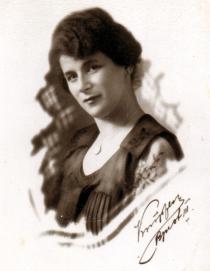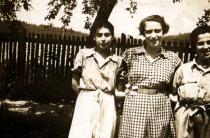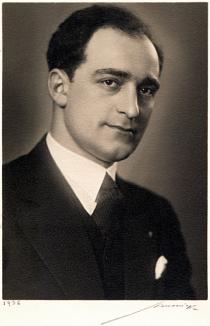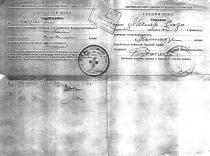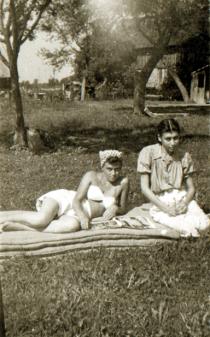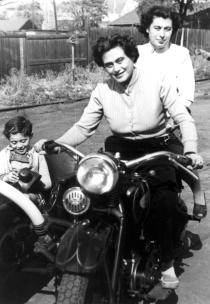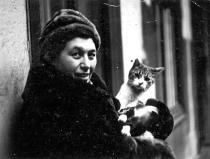
Zsuzsa Kobstein
Budapest
Hungary
Interviewers: Dora Sardi, Eszter Andor
I was born in the winter of 1920 in a hospital in Budapest. My parents
lived in Pilisvorosvar. It was such a cold winter that my father couldn't
get to Budapest. So, a telegram was sent to him saying, "Zsuzsa is born."
My father was also born in Pilisvorosvar in 1876. He was called Lipot
Maszler. He was an only son. His parents died before I was born. I don't
know anything about them. My father had another wife, but she died in
childbirth in 1916. Some time after that, he went with a friend to a dinner
with my mother's family. My mother and her sisters and brothers and her
parents sat on one side of the table and my father on the other side. My
mother sat across from him. When dinner was over, my father asked my mother
to marry him. They got married shortly after, in Obuda, and moved to
Pilisvorosvar. They lived in the house my father inherited from his
parents.
My mother, Margit Krausz, was born in 1890. She had 10 brothers and
sisters. My grandparents were quite religious, but my grandmother didn't
wear a shaytl. My grandfather had two kosher butcher shops in Obuda, but I
don't know where. I never saw them. One of my uncles also became a kosher
butcher. Sewing runs in the family. Three of my mother's relatives were
tailors or dressmakers, and Mother also loved to sew and do needlework. All
her brothers and sisters lived in Budapest, so they all survived the
Holocaust. We used to get together for big family occasions, but everybody
celebrated Jewish holidays separately in their homes.
Our house was on the main street of Pilisvorosvar. It was nicely furnished.
We had two big rooms, a kitchen and a huge garden. In the winter, we only
used the bedroom where we had heat. But from spring to autumn, we spent a
lot of time in the garden. We used to do our homework there and play with
other children from school and the neighborhood. We had Christian friends
as well. There wasn't this hatred at that time, in the 1920s. We got on
well with the Christians. We met our Jewish friends on Saturday in
synagogue or in the garden of the synagogue. My headmaster came to see
Mother often, and they would chat and my mother would teach her various
tricks in needlework. Our Christian friends invited us and my parents over
at Christmas to look at their Christmas tree, and they would send us a live
chicken for the holidays. My mother would send them matzot at Pesach.
My father worked as a business agent in the local coal mine. His job was to
collect orders from Budapest. My mother didn't work. She looked after us
and kept the household. She had a young Christian servant. Mother did a lot
of needlework, and she made most of our clothes.
My father went to synagogue every Friday, but on Saturdays he had to work.
But if he was free on Saturday, he went to shul and took us along. My
mother made challah on Friday and she taught us how to light the [Sabbath]
candles and what brochas to say. I still remember some of them. My mother
also made cholent, and we girls had to take it to a nearby Christian baker
and bring it home for Sabbath lunch. Many Jews did the same in
Pilisvorosvar. Every Saturday night, somebody from the community went
around to the Jewish families and told them where they could buy kosher
meet. So, the next day my mother would go and buy meat for the whole week
and put it in ice in the cellar to keep it fresh. We raised chickens at
home, and we would take some to the shochet every week.
We didn't go on holiday, but we often went on excursions on the weekends.
Sometimes all of us went, but often only my sister, I and my father went,
and Mother stayed at home. She would do some needlework and socialize with
her friends. My father was on very good terms with the local rabbi and the
Jewish pharmacist, and they would often pop in to chat with him.
My sister and I went to the local elementary school. It was a mixed school,
with Jews and Gentiles alike. We often went on excursions with the class
and we had many friends from school who came to play with us in our big
garden. It wasn't an Orthodox community, so we went to school on Saturday
and even wrote on that day. After elementary school, we went to the middle
school. But I only went for two years. I became very seriously ill and I
spent a long time in hospital and sanatorium.
When I recovered, I learned to sew. I became an apprentice in a little
dressmaking salon in Budapest and I worked there for two to three years.
Then, one day, my mother saw an advertisement in the newspaper from the
Berta Neumann salon. She went to see the owner and asked her to take my
sister and me on as dressmakers. We worked there until the German
occupation of Hungary.
We made beautiful dresses at the Berta Neumann salon, in the center of
Pest, for countesses and famous artists, like Katalin Karady. We had to get
up at 5 every morning and leave at 6. The train arrived in Nyugati station
at half-past 6. From there we took a tram and then walked. We had to change
into our elegant working clothes - a blue gown with a white collar. At 8
sharp, the manager of the workshop said: "Young ladies, it is time to
start." At half-past 9, the first table could take a break for 10 minutes.
Then the next table. We worked until 1 and then we had a two-hour lunch
break. The girls who lived outside Budapest brought their lunch with them.
There was a small stove and we could heat our lunch on it. In the summer,
we went for a walk during the lunch break or we sat in the Gerbeaud, a
patisserie. Then we worked until 6; we arrived home around 7. We envied
those who lived in Pest because they could go to the movies or go out. We
had to go home to Pilisvorosvar.
In 1942, the doctor told my parents that we should get out of the house in
Pilisvorosvar because it was bad for my health. This is why we moved to
Budapest. Mother went to see the rabbi of Obuda and asked him to give us a
flat. We got a one-room flat in the community building, which also housed
the Jewish elementary school. The rabbi arranged for my father to work in
the community. We enjoyed living in Budapest. For the first time since we
started to work in the Neumann salon, we didn't have to get up so early and
we had free time to go to the movies after work.
There were 50 to 60 girls in the workshop, many of them Jewish. But we had
to work Saturday mornings as well. We got our weekly pay at the end of the
workday on Saturday. On my way home, I'd buy candy, and I would give my
salary and the candy to my mother. After the German occupation of Hungary,
and only three days after a fashion show in the salon, it was confiscated,
together with the dresses, machines - everything.
I met my husband, Odon Kobstein, in our building. He and some other Jewish
boys who were in forced labor units were put up there for the night. During
the day they worked in a factory near Budapest. They would often come and
talk with us, and they helped us move to the cellar when there was an air
raid. In July 1944 as we were preparing to celebrate my mother's birthday,
she said to me, "We will make a big celebration, my dear." I asked her why,
and she told me that I would be engaged to Odon. He already had asked my
parents for my hand. I was very happy, but I didn't want to get married
yet, because we had nowhere to go.
When the Hungarian fascists took over the power in October 1944, we were
taken to the brick factory of Obuda. The older people were later sent off
to the ghetto in Pest, and we young people were marched to one of the train
stations, crammed into wagons and sent off to Ravensbruck. We arrived at
the beginning of December and stayed there about 5 weeks. Then those who
were in a condition to work were taken to the Messerschmitt factory. My
sister and I worked in the turnery until the middle of April. Then we were
deported, weak and ill with typhoid, to Mauthausen, and we were already
standing in front of the gas chambers, naked, with the dog tags around our
necks, when somebody came running and shouting, "Hey, Hungarians, we are
liberated!"
After our liberation, we spent three months in a hospital in Guzen. We left
the hospital when the Russians took it over from the Americans. We arrived
home in the summer of 1945. We found our parents in the old flat in Obuda.
My dear husband, my fiancé at that time, visited my parents every Sunday.
We arrived on a Sunday and he opened the door. "Zsuzsa," he said, "Where
have you been?!"
We married in 1947. We did not have a religious wedding, only a civil
ceremony. We moved into a small flat in Budapest and we found a small place
to set up a mechanics workshop. It was never nationalized because it was
small and we had no employees. My husband repaired only three things:
motorbikes, bicycles and sewing machines. At first, I wanted to go back to
dressmaking, but he asked me to help in the shop. So I was there all day,
and I used to sew. When people came in, they asked me if I would make
clothes for them as well. But I told them that I only sew for my husband. I
could never have any children because of the illness I had as an 8-year-old
child. But my dear husband told me that he loved me all the same.
My sister Judit married in 1948. She has a son, Gyuri. When he was at
university, he went to Japan to study Chinese and Japanese, and he never
came back. He lives in Australia. But he comes quite often and he also
calls me.
